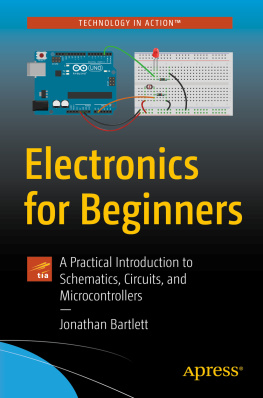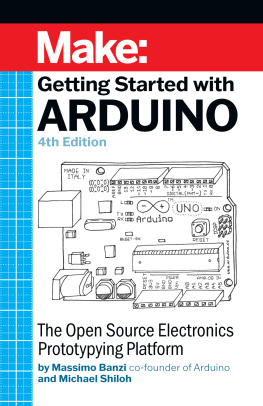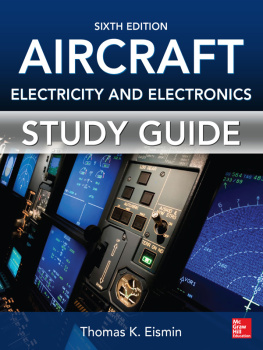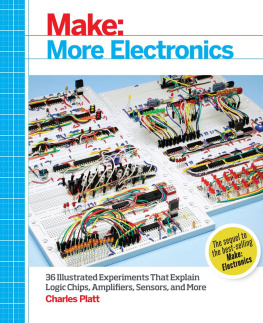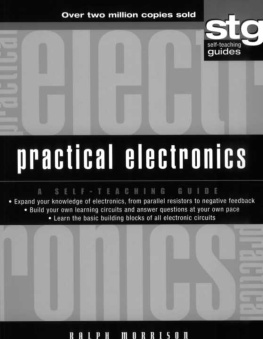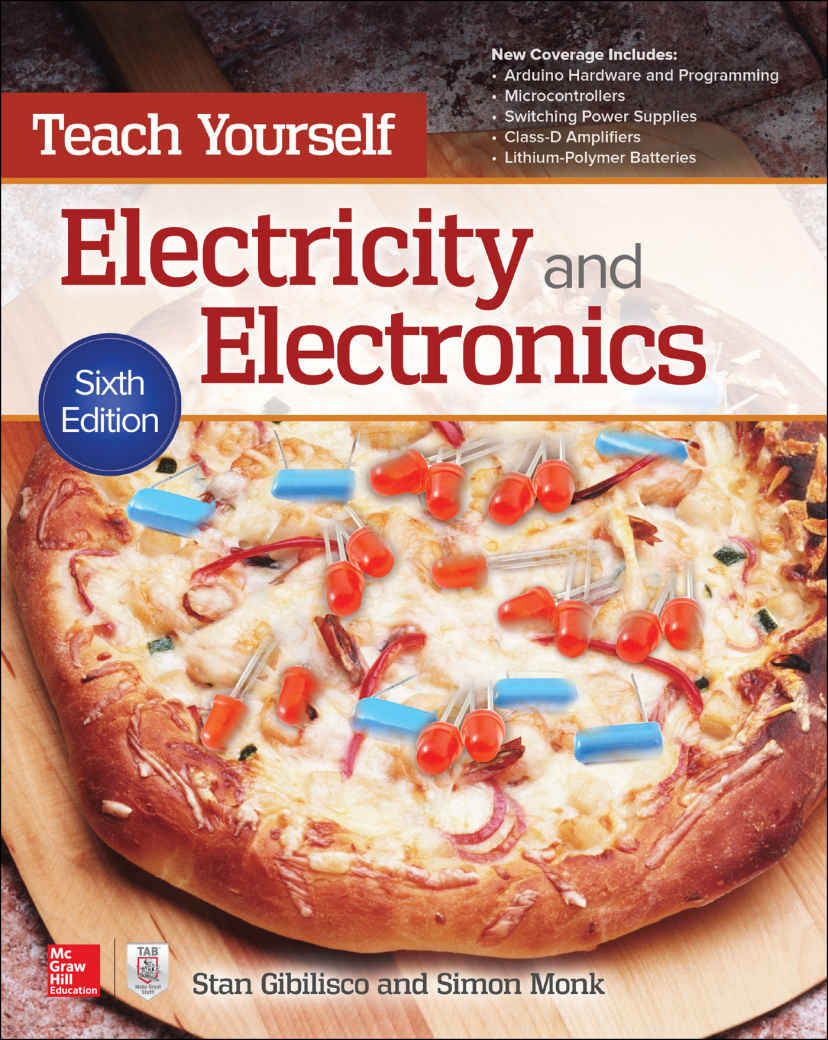About the Authors
Stan Gibilisco, a full-time writer, is an electronics hobbyist and engineer. He has been a ham radio operator since 1966. Stan has authored several titles for the McGraw-Hill Demystified and Know-It-All series, along with numerous other technical books and dozens of magazine articles. His Encyclopedia of Electronics (TAB Books, 1985) was cited by the American Library Association as one of the best references of the 1980s. Stan maintains a website at www.sciencewriter.net.
Dr. Simon Monk has a degree in Cybernetics and Computer Science and a PhD in Software Engineering. Dr. Monk spent several years as an academic before he returned to industry, co-founding the mobile software company Momote Ltd. He has been an active electronics hobbyist since his early teens and is a full-time writer on hobby electronics and open source hardware. Dr. Monk is the author of numerous electronics books, including Programming Arduino, Hacking Electronics, and Programming the Raspberry Pi.
Copyright 2016 by McGraw-Hill Education. All rights reserved. Except as permitted under the United States Copyright Act of 1976, no part of this publication may be reproduced or distributed in any form or by any means, or stored in a data base or retrieval system, without the prior written permission of the publisher.
ISBN: 978-1-25-958554-8
MHID: 1-25-958554-9
The material in this eBook also appears in the print version of this title: ISBN: 978-1-25-958553-1, MHID: 1-25-958553-0.
eBook conversion by codeMantra
Version 1.0
All trademarks are trademarks of their respective owners. Rather than put a trademark symbol after every occurrence of a trademarked name, we use names in an editorial fashion only, and to the benefit of the trademark owner, with no intention of infringement of the trademark. Where such designations appear in this book, they have been printed with initial caps.
McGraw-Hill Education eBooks are available at special quantity discounts to use as premiums and sales promotions or for use in corporate training programs. To contact a representative, please visit the Contact Us page at www.mhprofessional.com.
Information contained in this work has been obtained by McGraw-Hill Education from sources believed to be reliable. However, neither McGraw-Hill Education nor its authors guarantee the accuracy or completeness of any information published herein, and neither McGraw-Hill Education nor its authors shall be responsible for any errors, omissions, or damages arising out of use of this information. This work is published with the understanding that McGraw-Hill Education and its authors are supplying information but are not attempting to render engineering or other professional services. If such services are required, the assistance of an appropriate professional should be sought.
TERMS OF USE
This is a copyrighted work and McGraw-Hill Education and its licensors reserve all rights in and to the work. Use of this work is subject to these terms. Except as permitted under the Copyright Act of 1976 and the right to store and retrieve one copy of the work, you may not decompile, disassemble, reverse engineer, reproduce, modify, create derivative works based upon, transmit, distribute, disseminate, sell, publish or sublicense the work or any part of it without McGraw-Hill Educations prior consent. You may use the work for your own noncommercial and personal use; any other use of the work is strictly prohibited. Your right to use the work may be terminated if you fail to comply with these terms.
THE WORK IS PROVIDED AS IS. McGRAW-HILL EDUCATION AND ITS LICENSORS MAKE NO GUARANTEES OR WARRANTIES AS TO THE ACCURACY, ADEQUACY OR COMPLETENESS OF OR RESULTS TO BE OBTAINED FROM USING THE WORK, INCLUDING ANY INFORMATION THAT CAN BE ACCESSED THROUGH THE WORK VIA HYPERLINK OR OTHERWISE, AND EXPRESSLY DISCLAIM ANY WARRANTY, EXPRESS OR IMPLIED, INCLUDING BUT NOT LIMITED TO IMPLIED WARRANTIES OF MERCHANTABILITY OR FITNESS FOR A PARTICULAR PURPOSE. McGraw-Hill Education and its licensors do not warrant or guarantee that the functions contained in the work will meet your requirements or that its operation will be uninterrupted or error free. Neither McGraw-Hill Education nor its licensors shall be liable to you or anyone else for any inaccuracy, error or omission, regardless of cause, in the work or for any damages resulting therefrom. McGraw-Hill Education has no responsibility for the content of any information accessed through the work. Under no circumstances shall McGraw-Hill Education and/or its licensors be liable for any indirect, incidental, special, punitive, consequential or similar damages that result from the use of or inability to use the work, even if any of them has been advised of the possibility of such damages. This limitation of liability shall apply to any claim or cause whatsoever whether such claim or cause arises in contract, tort or otherwise.
In Memory of Jack
Contents
Preface
This book will help you learn the fundamentals of electricity and electronics without taking a formal course. It can serve as a do-it-yourself study guide or as a classroom text. This sixth edition contains new material about switching power supplies, class-D amplifiers, lithium-polymer batteries, microcontrollers, and Arduino.
Youll find a multiple-choice quiz at the end of every chapter. The quizzes are open-book, meaning that you may (and should) refer to the chapter text as you work out the answers. When you have finished a chapter, take the quiz, write down your answers, and then give your list of answers to a friend. Have the friend tell you your score, but not which questions you got wrong. That way, you can take the test again without bias.
When you reach the end of each section, youll encounter a multiple-choice test. A final exam concludes this course. The questions are a bit easier than the ones in the chapter-ending quizzes, but the tests are closed-book. Dont refer back to the text as you take the part-ending tests or the final exam. For all 35 chapter-ending quizzes, all four tests, and the final exam, a satisfactory score is at least three-quarters of the answers correct. The answer key is in .
If you need a mathematics or physics refresher, you can select from several of Stan Gibiliscos McGraw-Hill books dedicated to those topics. If you want to bolster your mathematics knowledge base before you start this course, study Algebra Know-It-All and Pre-Calculus Know-It-All. On the practical side, check out Electricity Experiments You Can Do at Home.
If you get bitten by the microcontroller bug, then youll find Simon Monks Programming Arduino: Getting Started with Sketches and Programming Arduino Next Steps: Going Further with Sketches useful companions to this book.
The authors welcome ideas and suggestions for future editions.
Stan Gibilisco
and
Simon Monk
PART
Direct Current
CHAPTER
Background Physics
YOU MUST UNDERSTAND SOME PHYSICS PRINCIPLES TO GRASP THE FUNDAMENTALS OF ELECTRICITY and electronics. In science, we can talk about qualitative things or quantitative things, that is, what versus how much. For now, lets focus on what and worry about how much later!


